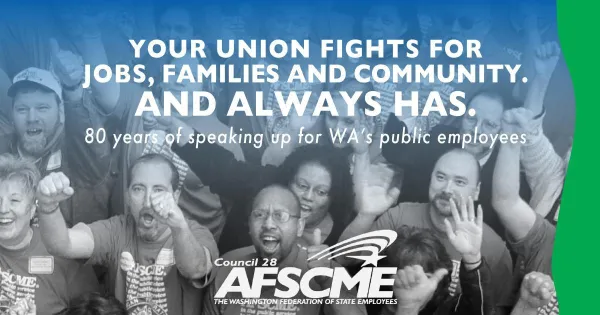WFSE History: 80 Years of Speaking up for WA's Public Workers
Founded in 1943, AFSCME Council 28/WFSE has grown from a small union of Tacoma welfare workers into a movement of over 50,000.
We have grown because our cause is a good one. Our union fights for jobs, family and community. And always has.
- Not a WFSE member? Join your union today!
- Share this flyer at your local meeting/workplace bulletin boards
Jump to:
- Early Years and Civil Service Reform
- Civil Rights
- Gender Pay Equity
- Collective Bargaining and Strike
- Pandemic Response and Recovery
- Get Involved in Our Future
Our union has a history we can be proud of.
We have expanded our power in the workplace and the Legislature, won respect for the jobs we perform, and looked beyond our union to make our state and country a better place to live in.
We have weathered recessions, attacks by anti-worker billionaires, a global pandemic, and each time we’ve come back stronger. “Our yesterdays prepare us for today,” is what the founder of our union, Neville Crippen, said. And it’s true.
Early Years and Civil Service Reform
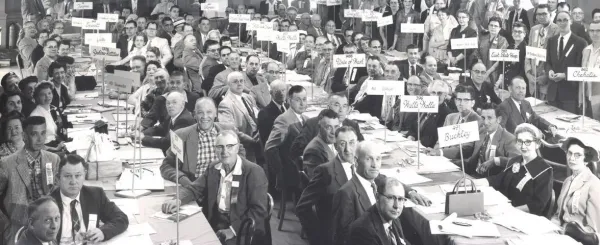
WFSE's early years began back in 1938 during the Great Depression and culminated in the toppling the most hated facet of working in Washington’s public sector, the spoils system in 1960.
You're probably familiar with the term "To the victor go the spoils." What you may not know is that until 1960, state government jobs were a big part of the “spoils” for newly elected governors.
Every new administration that came in would fire most of the holdover employees and replace them with political supporters, friends and family members. WFSE members organized for years to stop this cycle and protect public services, eventually introducing a civil service initiative.
Our efforts culminated in a last-minute, dramatic delivery by helicopter of the signatures needed to bring the issue to the ballot. Civil service reform provided a baseline of stability, dignity and respect on the job that our union built from in the coming years.
Learn more
Civil Rights
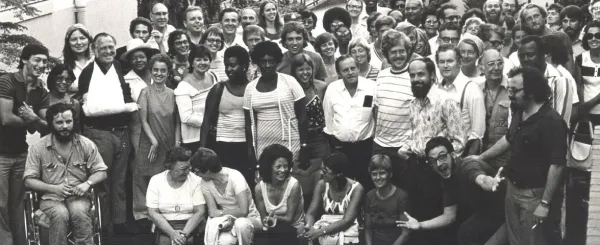
During the Civil Rights Movement, our union took a leading role by aggressively organizing across economic, racial and social lines to guarantee that anyone could find fair pay, dignity and respect in the public sector.
Even before the AFSCME International Executive Board established a committee for civil rights at the international level, WFSE had one to fight workplace discrimination in Washington.
In 1961, WFSE's Executive Board created the Civil Rights Committee, which lives on today as the WFSE Equity, Diversity and Inclusion Committee.
Learn more
Gender Pay Equity
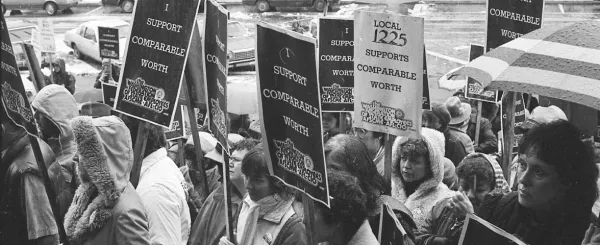
For decades, state jobs that were predominately held by women were systematically underpaid in Washington state.
In 1985, our union won a settlement from the state of $482 million which was paid out to tens of thousands of workers in these job classes. By the time the last comparable worth adjustment was made in 1992, a secretary at a state college or university had seen a pay jump of 22 percent.
Today, new employees coming into state government continue to benefit from the WFSE comparable worth win.
Learn more.
Collective Bargaining and Strike
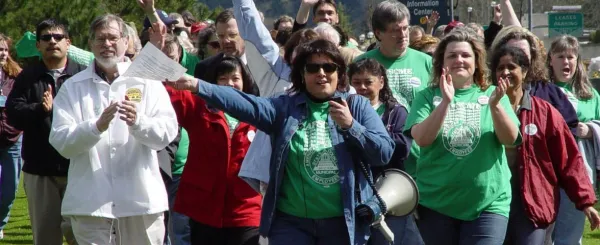
For most of our history, our union did not have full-scope collective bargaining rights. All economic requests, like raises and cost-of-living adjustments, had to go to the Legislature, which could ignore them or alter them as they saw fit.
We never knew from day to day what our economic future would look like. That changed in 2002 when our union finally won full-scope collective bargaining rights.
It took countless rallies, countless bills in the Legislature, and finally WFSE’s first-ever strike, a ten-week campaign of rolling walkouts in 2001.
Learn more.
Pandemic Response and Recovery
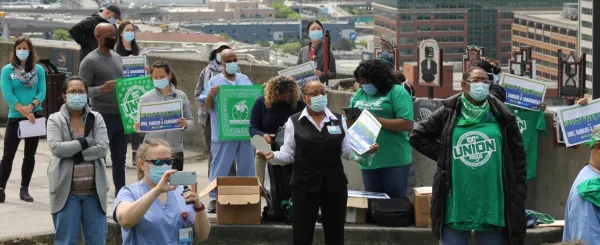
The COVID-19 pandemic arrived in the United States in Washington state first, and WFSE members met the crisis of our lifetimes head on.
We pushed back on furloughs and cuts. We kept our universities, medical facilities, and communities running. We provided life-saving services and won vital workplace protections that were eventually extended to all workers across the state.
Our members showed heroic dedication to the many people who rely on us—and we stuck with our union through the crisis.
Learn more.
Our Future
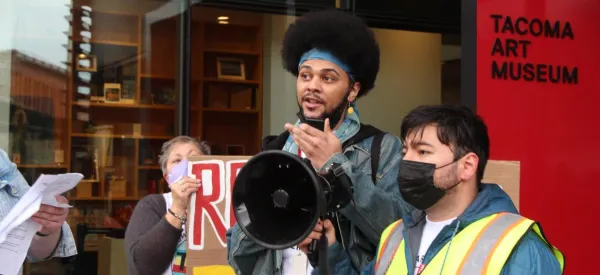
In our 80 years of history, our union has overcome every obstacle that has come our way. We’ve faced setbacks, but we have always come back stronger.
- Who decided to create a modern civil service system, one in which workers who serve the public are hired based on their ability, not on their political allegiance?
- Who pushed for our union to take a leading role in the struggle for civil rights and gender equality?
- Who led us to undertake our first and only statewide strike, finally opening the door to full-scope collective bargaining rights?
You did.
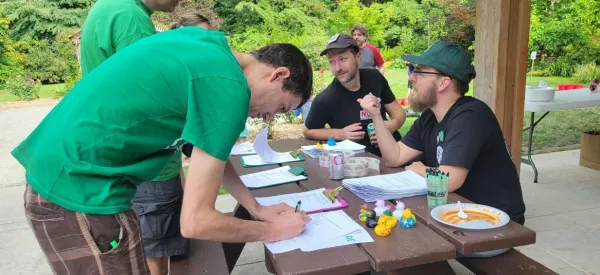
Members did by exercising their rights, by attending local meetings, by running for elected office, by getting involved.
Through our union, each of us holds immense power to shape the future. Every major victory in our history has started with small steps. Members are taking them every day. We invite you to take them with us.
- Become a Member Today
- Don't have a union at your workplace? Organize with WFSE!
- Find WFSE Events on the Events Calendar (if looking on mobile, turn your phone sideways to see meeting dates)
- Get Involved with Your Local
